12 Traditional Greek Foods that are Healthy and Tasty
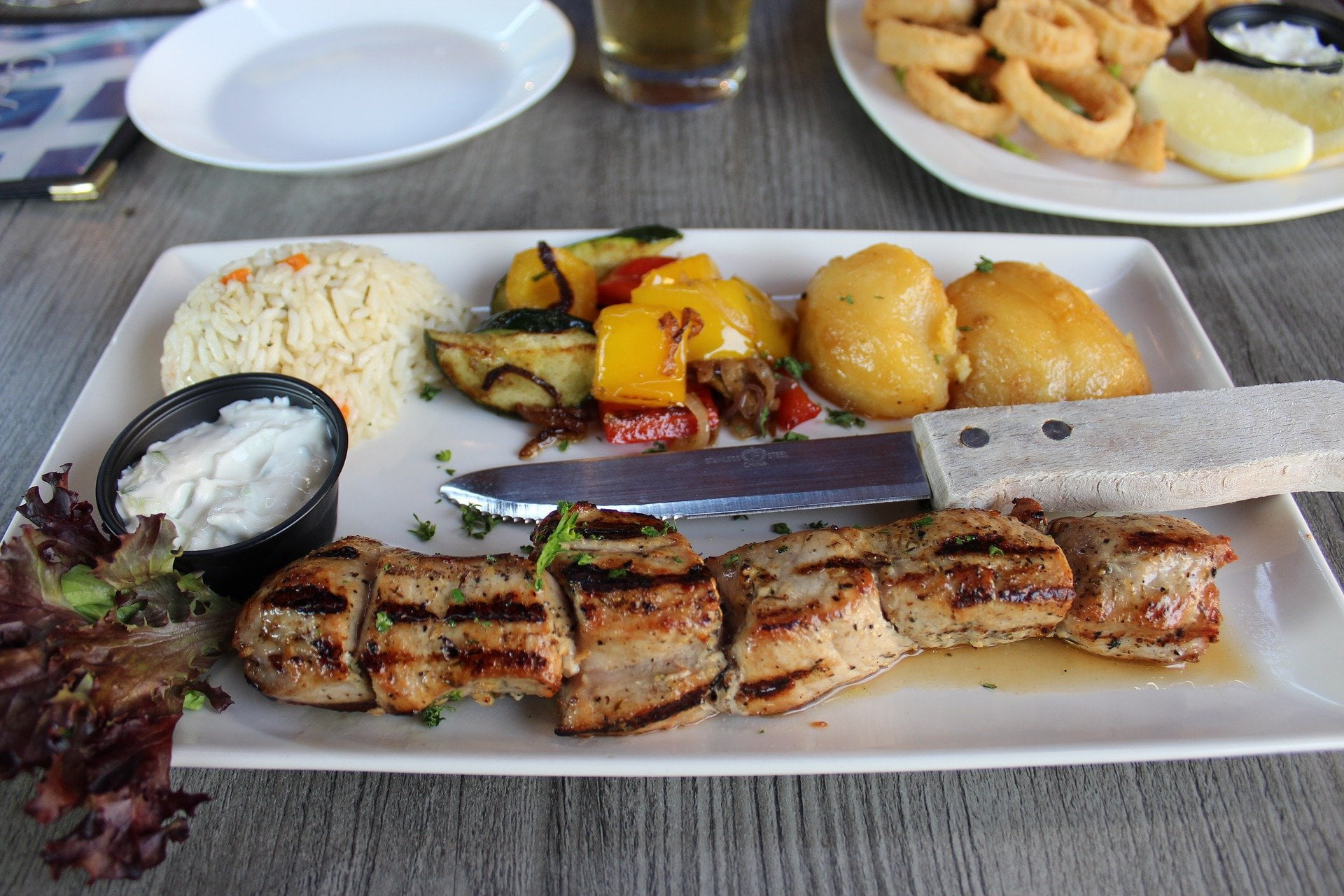
OliIn the 1960s, Greeks lived longer and had lower rates of chronic diseases than the rest of the world. This was probably due to their diet, which was enriched with seafood, fruits, vegetables, seeds, beans, and healthy fats. The Mediterranean diet is based on traditional Greek cuisine and other similar cuisines of the surrounding countries. Research shows that following the Mediterranean Diet can reduce the risk of heart attack, stroke, diabetes, obesity, and premature death.
This article examines 12 traditional Greek dishes, compatible with the Mediterranean diet that are extremely healthy and analyzes why this happens. The traditional Greek cuisine, apart from being delicious, is also extremely healthy. Let’s discover it together!
 Tzatziki is another popular dip used in Greek cuisine. While it is very creamy, it is quite low in calories, with about 35 calories per two tablespoons. Tzatziki is made from strained yogurt, cucumbers, garlic, and olive oil.
Tzatziki is another popular dip used in Greek cuisine. While it is very creamy, it is quite low in calories, with about 35 calories per two tablespoons. Tzatziki is made from strained yogurt, cucumbers, garlic, and olive oil.
The strained yogurt has been processed to remove the water and make it creamier preventing rapid deterioration. Its lactose content is also reduced, which makes it higher in protein. Just 100 grams of yogurt provide 10 grams of protein to the body. Protein is one of the most important nutrients for weight loss. It can help reduce appetite, regulate hunger hormones, and increase metabolism.

Dolmades
Dolmades are stuffed vine leaves with rice, minced meat, and various herbs that can be served as an appetizer or main course.
Vine leaves are low in calories and high in fiber. They also have high amounts of vitamin A and vitamin K. In addition, they have a very high content of antioxidants. Research shows that they have ten times the antioxidant activity of grape juice or pulp. Moreover, they can improve blood circulation in people with chronic venous insufficiency. Dolmades are flavored with different herbs and spices. Herbs and spices are an important part of Greek cuisine and also contain many health benefits. For example, many recipes for this dish include parsley and dill. Dill is believed to be a good source of antioxidants and can slow down the growth of disease-causing bacteria and fungi. It can also improve digestive health. And parsley is an excellent source of vitamin K, which not only helps prevent blood clots from forming but also supports bone and heart health.
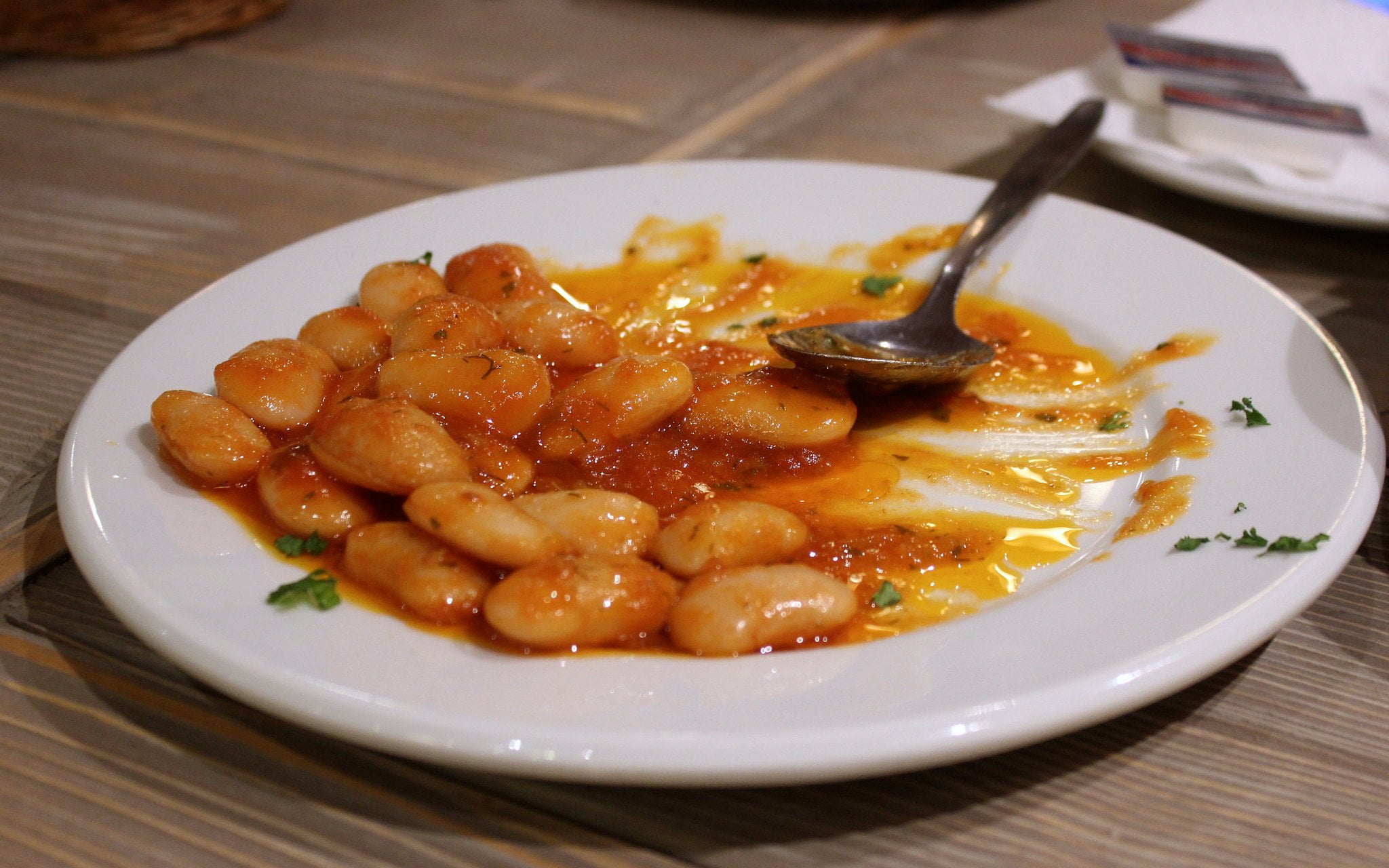
A meal of giant beans Photo Credit: Kandukuru Nagarjun
Gigandes Plaki
Gigandes plaki are giant beans. The word “plaki” means an oven-baked dish with vegetables and tomatoes.
Beans are very nutritious and are an excellent and important source of protein for vegetarians. They also help with weight loss, as they are high in fiber and protein. Furthermore, research shows that people who eat more beans have a lower risk of heart disease. Beans are also known to help control blood sugar and diabetes.

Egg Lemon Sauce
Egg lemon sauce is a traditional Greek technique used in soups. We usually add it to chicken or meat soups that contain vegetables and rice. It is actually a beaten egg with lemon.
Interestingly, some research suggests that chicken soup may not only help reduce the symptoms of colds and flu but also help fight it. One study looked at how hot water and hot chicken soup affected a stuffy nose. Studies show that hot water and chicken soup were the best solutions for relieving a cold. Another recent study showed that carnosine, a compound in chicken soup, fights the flu in its early stages. Egg lemon also contains high levels of protein from chicken and eggs, all of which are relatively low in calories. A serving of traditional chicken soup with eggnog contains 27 grams of protein and 245 calories. Nevertheless, it may be high in sodium, so it may not be the best choice for people with salt sensitivity.

Lentil Soup
Lentil soup can be made with or without tomatoes and is a key ingredient in the Greek diet. It is an excellent source of protein and fiber. Just one cup of lentils contains 18 grams of protein and 16 grams of fiber. This popular legume is famous throughout the Mediterranean and contains many vitamins and minerals, which makes it an excellent food for vegetarians, as vegetarian diets are often low in iron, protein, and zinc. Additionally, research shows that lentils can help lower blood pressure, fight cancer, control blood sugar, and lower cholesterol.

Souvlaki by greek flavours
Souvlaki
The souvlaki consists of small pieces of cooked meat and is one of the most famous Greek foods. You can find souvlaki all over Greece and in almost every Greek restaurant around the world. The souvlaki is usually from pork, chicken, lamb, or beef.
Meat provides many nutrients such as protein, iron, and B-vitamins. In addition, meat is a complete protein, which means that it has all the essential amino acids. Diets high in protein help with weight loss. Meat intake is also associated with increased muscle mass, which is especially important for the elderly. The souvlaki is usually served in fast-food restaurants with french fries. However, you can try to get a salad instead for a healthier meal.
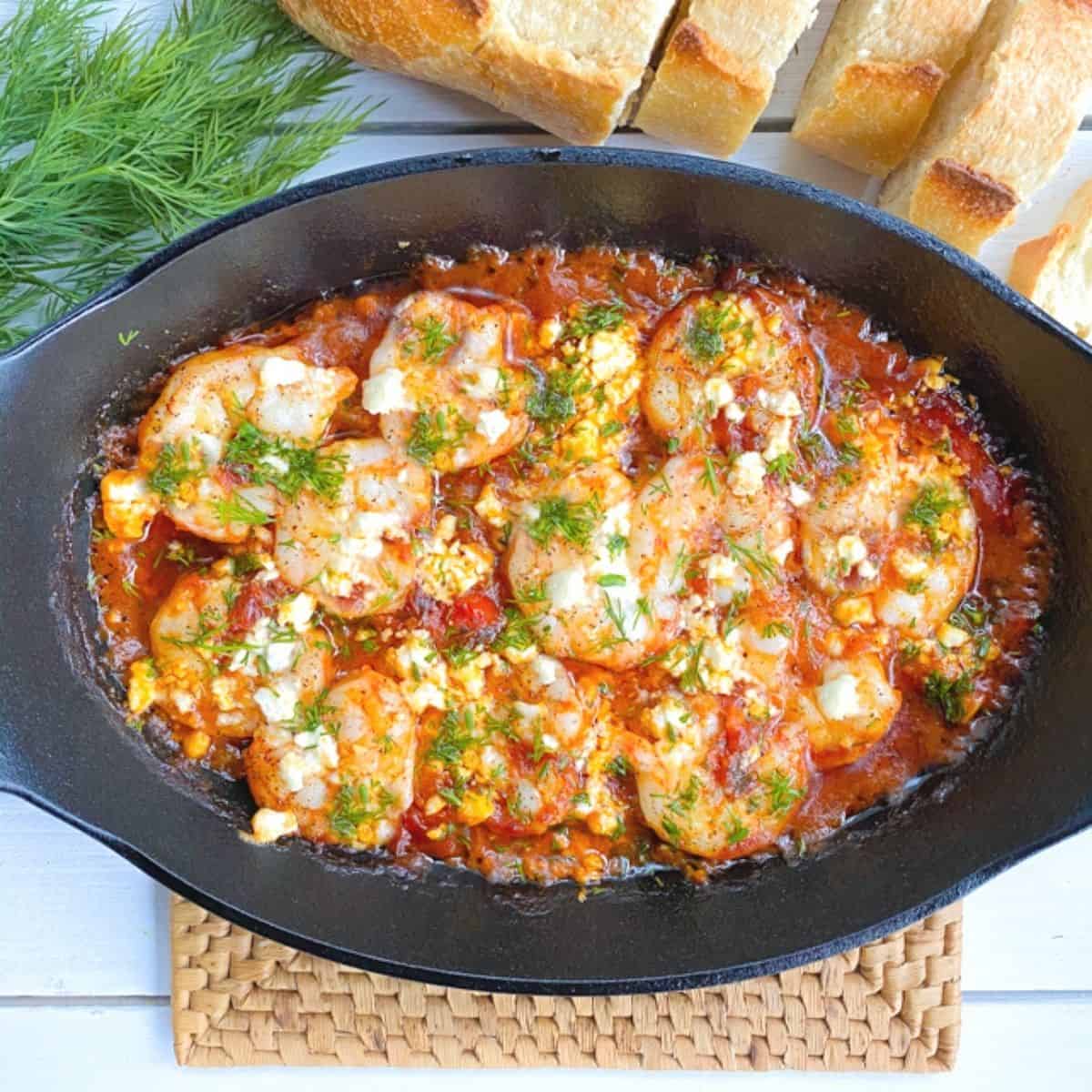
Shrimp Saganaki by Aleka’s get-together
Saganaki Shrimp
Saganaki shrimp is a traditional Greek appetizer that is delicious and healthy. It is a salty tomato sauce in which the shrimp are cooked and is traditionally served in a pan, known as saganaki. Shrimp and other shellfish are an important part of the Greek and Mediterranean diet. It is also extremely healthy food.
Shrimp is high in protein and very low in fat. An 85-gram serving contains 18 grams of protein and only 1 gram of fat. It also provides about 50% of your daily selenium intake, which can help reduce inflammation and also reduce the risk of prostate cancer. While shrimp are high in cholesterol, research shows that this cholesterol has little or no effect on blood cholesterol in most people. Tomatoes are the other main ingredient in this dish and are rich in antioxidants such as vitamin C and lycopene. Lycopene is a powerful antioxidant that gives tomatoes their red color. It has been linked to a reduced risk of heart disease and cancer.
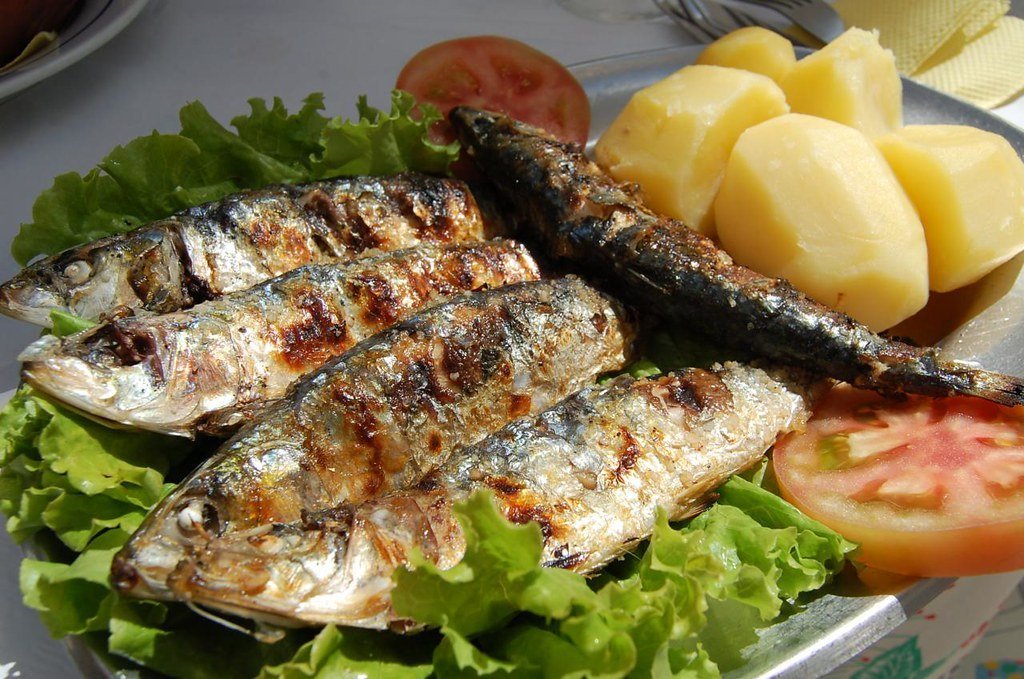
Grilled Sardines Photo Credit: Yusuke Kawasaki
Grilled Sardines
Fish is essential in the Greek and Mediterranean diet. High intake of fish, especially fatty fish, has been repeatedly linked to many health benefits, including reduced risk of heart disease. Sardines are one of the most commonly consumed fish in Greece. These small, fatty fish are not only delicious but also one of the healthiest foods you can eat. In fact, it is a great source of EPA and DHA. These are types of omega-3 fatty acids that have been linked to many health benefits. 100 grams of sardines contain 473 mg EPA and 509 mg DHA which can reduce the risk of dying from heart disease by at least 25%. DHA is also vital for brain health. Not only is it critical for healthy brain development in infants, but it also promotes healthy brain aging.
In addition to the healthy fats that sardines provide to the body, they are also good for your bones, as they contain high amounts of protein, calcium, and vitamin D.
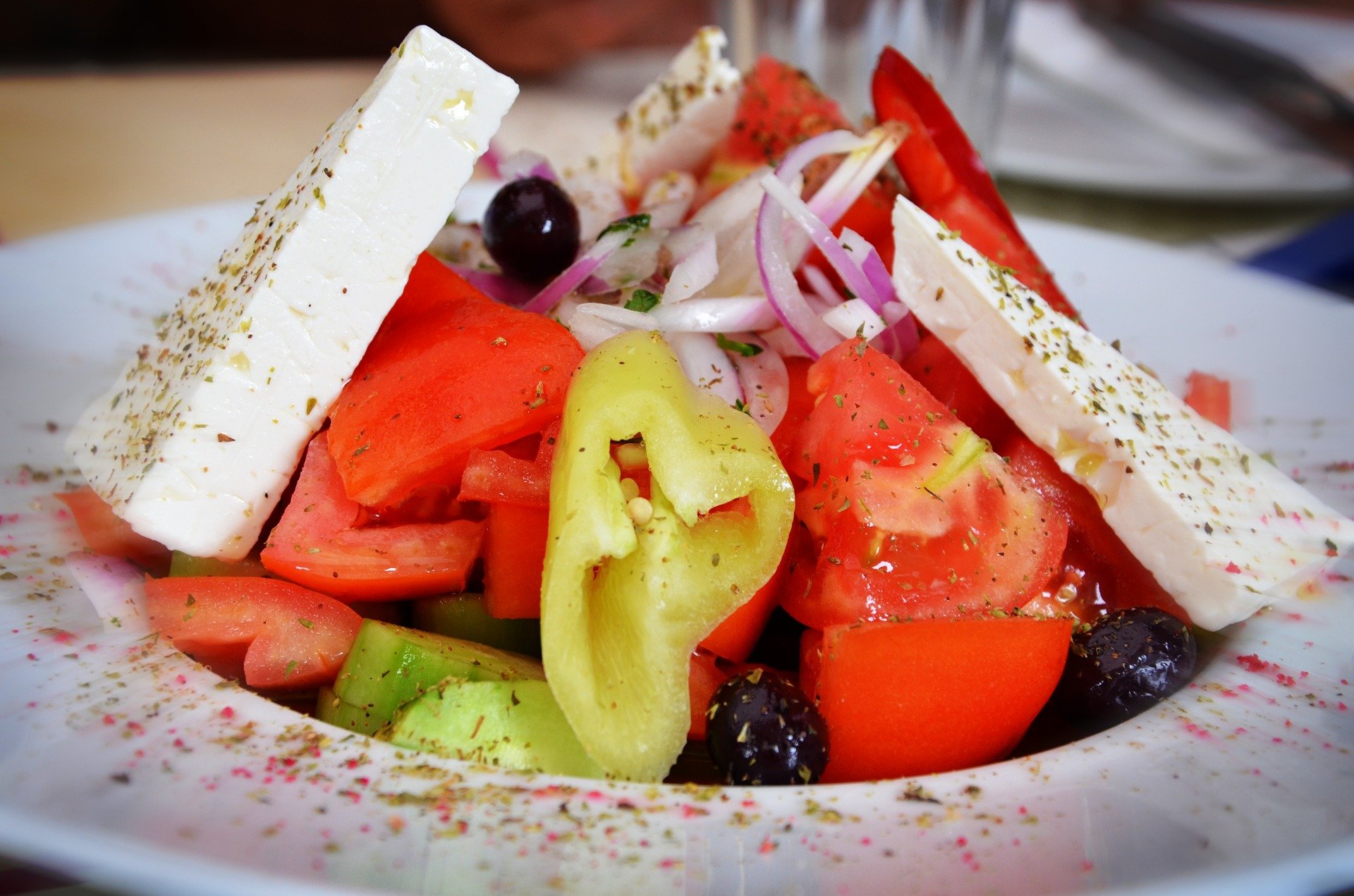
Greek Salad
Greek Salad
We are talking about the most popular Greek salad, known worldwide. It includes tomatoes, onions, cucumbers, olives, and feta, with plenty of olive oil and vinegar. All these ingredients are full of nutrients and are basic ingredients of Greek cuisine.
The vegetables in the salad make it high in fiber. These vegetables also contain many antioxidants and nutrients, such as vitamin C, vitamin K, and potassium. Olives and olive oil contain healthy monounsaturated fats. These fats can reduce the risk of heart attack and stroke, as well as reduce inflammation. The feta that is usually placed on the salad is another basic ingredient of Greek cuisine.
Feta is from goat’s and sheep’s milk. It is good for your bones, as it has a high content of calcium, protein, and phosphorus. In fact, it contains more calcium than most cheeses.
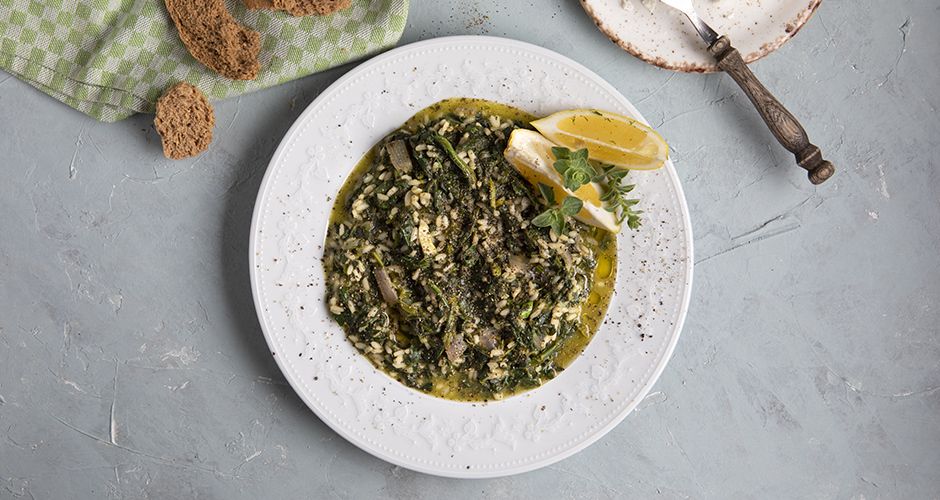
Spanakorizo by Akis Petretzikis
Spinach with Rice
Spanakorizo is a dish of Greek cuisine with and rice traditionally served with lemon, feta, and olive oil. Spinach is one of the healthiest vegetables you can eat as it contains Vitamin A, Vitamin C, Vitamin K, Folic acid, Potassium, and Iron. It also contains many antioxidants that help prevent cell damage. Rice is also rich in many vitamins and minerals, such as manganese, selenium, and iron. However, rice and spinach do not absorb iron as they are plant sources. Fortunately, this dish contains lemon, which due to the citric acid it contains helps in the absorption of iron.

Boiled Greens
Wild greens when boiled are a dish that is a key element in Greek households. Olive oil and lemon juice complements this dish. Greens are a key ingredient in the Mediterranean diet and it is very common to consume throughout the Mediterranean.
Most wild greens are extremely high in antioxidants. One study found that many wild greens contain more antioxidants than blueberries. Research shows that they retain antioxidants better than most foods.
While the exact nutrient content will vary depending on the greens you use, all green leafy vegetables are high in vitamin K and low in fiber. Moreover, all leafy green vegetables are also good sources of dietary nitrates. Recent studies have shown that a diet rich in nitrates from vegetables can lower blood pressure and reduce the risk of glaucoma.
Contact us here and one of our experienced travel designers will create the tastiest ‘traditional Greek food’ itinerary for you and your loved ones!
Feeling Ready?
From our blog

Romantic things to do in Greece: A couple’s guide

Weather in Greece in November

Weather in Greece in October: Your Ultimate Guide

Best Greek Island for teenage families to explore this summer

What to See in Greece: Ultimate Travel Guide

The Ultimate Guide to Greece Family Vacation

Visiting Greece in December: Complete Travel Guide

Best Resorts in Greece for Families: Your Ultimate 2024 Guide

Weather in Greece in September: Ultimate Travel Guide
